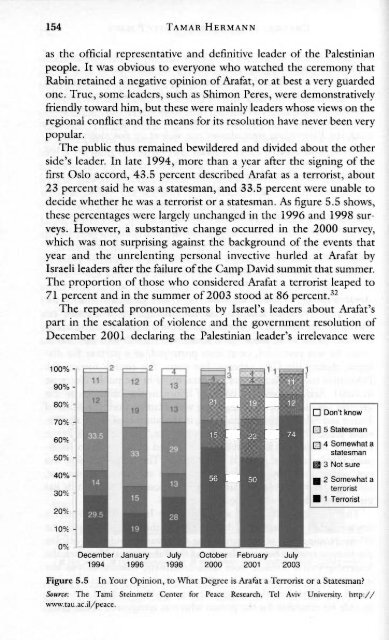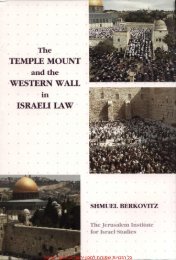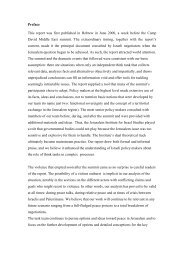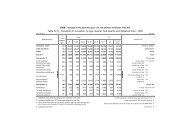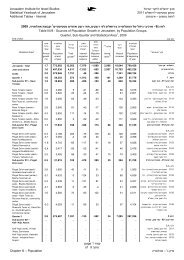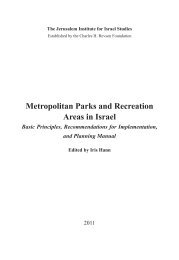- Page 1 and 2:
THE ISRAELI-PALESTINIAN CONFLICT Fr
- Page 5 and 6:
THE ISRAELI-PALESTINIAN CONFLICT: F
- Page 7:
THE ISRAELI-PALESTINIAN CONFLICT ©
- Page 10 and 11:
viii CONTENTS 6 A Psychological Ear
- Page 13:
LIST OF FIGURES 4.1 Overview of the
- Page 17 and 18:
ABOUT THE AUTHORS YAACOV BAR-SIMAN-
- Page 19 and 20:
INTRODUCTION Taacov Bar-Siman-Tov T
- Page 21 and 22:
INTRODUCTION 3 default option. At t
- Page 23 and 24:
INTRODUCTION 5 Israeli-Palestinian
- Page 25 and 26:
INTRODUCTION 7 prism through which
- Page 27 and 28:
CHAPTER I DIALECTIC BETWEEN CONFLIC
- Page 29 and 30:
CONFLICT MANAGEMENT AND RESOLUTION
- Page 31 and 32:
CONFLICT MANAGEMENTAND RESOLUTION 1
- Page 33 and 34:
CONFLICT MANAGEMENTAND RESOLUTION 1
- Page 35 and 36:
CONFLICT MANAGEMENTAND RESOLUTION 1
- Page 37 and 38:
CONFLICT MANAGEMENTAND RESOLUTION 1
- Page 39 and 40:
CONFLICT MANAGEMENTAND RESOLUTION 2
- Page 41 and 42:
CONFLICT MANAGEMENTAND RESOLUTION 2
- Page 43 and 44:
CONFLICT MANAGEMENTAND RESOLUTION 2
- Page 45 and 46:
CONFLICT MANAGEMENT AND RESOLUTION
- Page 47 and 48:
CONFLICT MANAGEMENTAND RESOLUTION 2
- Page 49 and 50:
CONFLICT MANAGEMENTAND RESOLUTION :
- Page 51 and 52:
CONFLICT MANAGEMENTAND RESOLUTION 3
- Page 53 and 54:
CONFLICT MANAGEMENTAND RESOLUTION 3
- Page 55 and 56:
CONFLICT MANAGEMENTAND RESOLUTION 3
- Page 57 and 58:
CONFLICT MANAGEMENT AND RESOLUTION
- Page 59 and 60:
CHAPTER 2 THE INFLUENCES OF HEURIST
- Page 61 and 62:
HEURISTIC THOUGHT AND GROUP DYNAMIC
- Page 63 and 64:
H E U R I S T I C T H O U G H T A N
- Page 65 and 66:
H E U R I S T I C T H O U G H T A N
- Page 67 and 68:
H E U R I S T I C T H O U G H T A N
- Page 69 and 70:
H E U R I S T I C T H O U G H T A N
- Page 71 and 72:
H E U R I S T I C T H O U G H T A N
- Page 73 and 74:
H E U R I S T I C T H O U G H T A N
- Page 75 and 76:
H E U R I S T I C T H O U G H T A N
- Page 77 and 78:
H E U R I S T I C T H O U G H T A N
- Page 79 and 80:
H E U R I S T I C T H O U G H T A N
- Page 81 and 82:
H E U R I S T I C T H O U G H T A N
- Page 83:
H E U R I S T I C T H O U G H T A N
- Page 86 and 87:
70 Y. S I M A N - T O V , E. LAVIE,
- Page 88 and 89:
72 Y. S I M A N - T O V , E. L A V
- Page 90 and 91:
74 Y. S I M A N - T O V , E. L A V
- Page 92 and 93:
76 Y. S I M A N - T O V , E. L A V
- Page 94 and 95:
78 Y. S I M A N - T O V , E. LAVIE,
- Page 96 and 97:
80 Y. S I M A N - T O V , E. L A V
- Page 98 and 99:
82 Y. S I M A N - T O V , E. L A V
- Page 100 and 101:
84 Y. S I M A N - T O V , E. L A V
- Page 102 and 103:
86 Y. S I M A N - T O V , E. LAVIE,
- Page 104 and 105:
88 Y. S I M A N - T O V , E. L A V
- Page 106 and 107:
90 Y. S I M A N - T O V , E. L A V
- Page 108 and 109:
92 Y. S I M A N - T O V , E. LAVIE,
- Page 110 and 111:
94 Y. S I M A N - T O V , E. L A V
- Page 112 and 113:
96 Y. S I M A N - T O V , E. LAVIE,
- Page 114 and 115:
98 Y. S I M A N - T O V , E. L A V
- Page 116 and 117:
100 Y. S I M A N - T O V , E. LAVIE
- Page 118 and 119:
102 K O B I M I C H A E L The prime
- Page 120 and 121: 104 K O B I M I C H A E L clarify t
- Page 122 and 123: 106 K O B I M I C H A E L accept, c
- Page 124 and 125: 108 K O B I M I C H A E L The milit
- Page 126 and 127: 110 K O B I M I C H A E L From that
- Page 128 and 129: 112 K O B I M I C H A E L establish
- Page 130 and 131: 114 K O B I M I C H A E L shifting
- Page 132 and 133: 116 K O B I M I C H A E L irrelevan
- Page 134 and 135: M I L I T A R Y E C H E L O N A N D
- Page 136 and 137: 120 K O B I M I C H A E L so the bo
- Page 138 and 139: 122 K O B I M I C H A E L Ya'alon's
- Page 140 and 141: M I L I T A R Y E C H E L O N A N D
- Page 142 and 143: 126 K O B I M I C H A E L CONCLUSIO
- Page 144 and 145: 128 K O B I M I C H A E L confronta
- Page 146 and 147: 130 KoBi M I C H A E L 10. Amos Har
- Page 148 and 149: 132 K O B I M I C H A E L also Ben-
- Page 150 and 151: 134 T A M A R H E R M A N N about t
- Page 152 and 153: 136 T A M A R H E R M A N N of the
- Page 154 and 155: 138 T A M A R H E R M A N N The mul
- Page 156 and 157: 140 T A M A R H E R M A N N securit
- Page 158 and 159: 142 T A M A R H E R M A N N are con
- Page 160 and 161: 144 T A M A R H E R M A N N the val
- Page 162 and 163: C H A N G E S I N I S R A E L ' S S
- Page 164 and 165: 148 T A M A R H E R M A N N 13 29
- Page 166 and 167: 150 T A M A R H E R M A N N settlem
- Page 168 and 169: 152 T A M A R H E R M A N N deterio
- Page 172 and 173: 156 T A M A R H E R M A N N Table 5
- Page 174 and 175: 158 T A M A R H E R M A N N revoke
- Page 176 and 177: 160 T A M A R H E R M A N N Unilate
- Page 178 and 179: 162 T A M A R H E R M A N N themsel
- Page 180 and 181: 164 T A M A R H E R M A N N inordin
- Page 182 and 183: 166 T A M A R H E R M A N N 3. Gila
- Page 184 and 185: CHAPTER 6 A PSYCHOLOGICAL EARTHQUAK
- Page 186 and 187: 170 D A N I E L B A R - T A L A N D
- Page 188 and 189: 172 DANIEL BAR-TAL AND KEREN SHARVI
- Page 190 and 191: 174 DANIEL BAR-TAL AND KEREN SHARVI
- Page 192 and 193: 176 DANIEL BAR-TAL AND KEREN SHARVI
- Page 194 and 195: 178 DANIEL BAR-TAL AND KEREN SHARVI
- Page 196 and 197: 180 DANIEL BAR-TAL AND KEREN SHARVI
- Page 198 and 199: 182 DANIEL BAR-TAL AND KEREN SHARVI
- Page 200 and 201: 184 DANIEL BAR-TAL AND KEREN SHARVI
- Page 202 and 203: 186 DANIEL BAR-TAL AND KEREN SHARVI
- Page 204 and 205: 188 DANIEL BAR-TAL AND KEREN SHARVI
- Page 206 and 207: 190 DANIEL BAR-TAL AND KEREN SHARVI
- Page 208 and 209: 192 DANIEL BAR-TAL AND KEREN SHARVI
- Page 210 and 211: 194 DANIEL BAR-TAL AND KEREN SHARVI
- Page 212 and 213: 196 DANIEL BAR-TAL AND KEREN SHARVI
- Page 214 and 215: 198 DANIEL BAR-TAL AND KEREN SHARVI
- Page 216 and 217: 200 DANIEL BAR-TAL AND KEREN SHARVI
- Page 218 and 219: 202 DANIEL BAR-TAL AND KEREN SHARVI
- Page 220 and 221:
204 K. SHARVIT AND D. BAR-TAL (Firs
- Page 222 and 223:
206 K. SHARVIT AND D. BAR-TAL intel
- Page 224 and 225:
208 K. SHARVIT AND D.BAR-TAL CHANGE
- Page 226 and 227:
210 K. SHARVITAND D. BAR-TAL functi
- Page 228 and 229:
212 K. SHARVIT AND D. BAR-TAL media
- Page 230 and 231:
214 K. SHARVITAND D. BAR-TAL Relian
- Page 232 and 233:
216 K. SHARVITAND D. BAR-TAL ETHOS
- Page 234 and 235:
218 K. SHARVITAND D. BAR-TAL In con
- Page 236 and 237:
220 K. SHARVIT AND D. BAR-TAL pictu
- Page 238 and 239:
222 K. SHARVIT AND D. BAR-TAL We ha
- Page 240 and 241:
224 K. SHARVIT AND D. BAR-TAL in th
- Page 242 and 243:
226 K. SHARVITAND D. BAR-TAL threat
- Page 244 and 245:
228 K. SHARVITAND D. BAR-TAL Balint
- Page 246 and 247:
230 K. SHARVIT AND D. BAR-TAL Gitli
- Page 248 and 249:
232 K. SHARVITAND D. BAR-TAL Stein,
- Page 250 and 251:
234 EPHRAIM LAVIE Palestinian socie
- Page 252 and 253:
236 EPHRAIM LAVIE (revolution, libe
- Page 254 and 255:
238 EPHRAIM LAVIE Seeking to preser
- Page 256 and 257:
240 EPHRAIM LAVIE security units, t
- Page 258 and 259:
242 EPHRAIM LAVIE survival as leade
- Page 260 and 261:
244 EPHRAIM LAVIE the confrontation
- Page 262 and 263:
246 EPHRAIM LAVIE profit and loss b
- Page 264 and 265:
248 EPHRAIM LAVIE identical pragmat
- Page 266 and 267:
250 EPHRAIM LAVIE THE NATIONAL CAMP
- Page 268 and 269:
252 EPHRAIM LAVIE In the situation
- Page 270 and 271:
254 EPHRAIM LAVIE was aware of the
- Page 272 and 273:
256 EPHRAIM LAVIE • The integrati
- Page 274 and 275:
258 EPHRAIM LAVIE 9. The aid from t
- Page 276 and 277:
260 EPHRAIM LAVIE preventive action
- Page 278 and 279:
262 Y. SlMAN-TOV AND K. MlCHAEL by
- Page 280 and 281:
264 Y. SlMAN-Tov AND K. MlCHAEL REA
- Page 282 and 283:
266 Y. SlMAN-TOV AND K. MlCHAEL Eve
- Page 284 and 285:
268 Y. SlMAN-TOV AND K. MICHAEL tha
- Page 286 and 287:
270 Y. SIMAN-TOV AND K. MlCHAEL the
- Page 288 and 289:
272 Y. SlMAN-TOV AND K. MlCHAEL The
- Page 290 and 291:
274 Y. SlMAN-TOV AND K. MlCHAEL The
- Page 292 and 293:
276 Y. SIMAN-TOVAND K. MICHAEL Isra
- Page 294 and 295:
278 Y. SIMAN-TOV AND K. MlCHAEL of
- Page 296 and 297:
280 Y. SIMAN-TOVAND K. MICHAEL form
- Page 298 and 299:
282 Y. SlMAN-TOV AND K. MICHAEL Fra
- Page 300 and 301:
284 INDEX Conflict Uncontrolled 26
- Page 302 and 303:
286 INDEX National Security Council
- Page 307 and 308:
lia valori Professor ot internation


